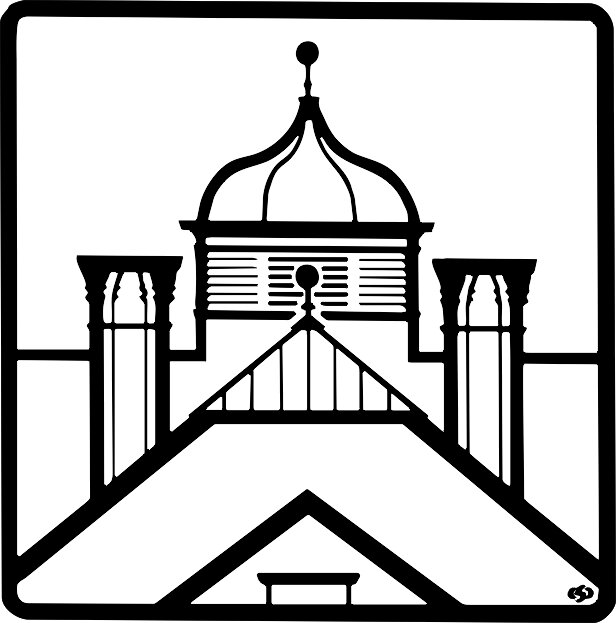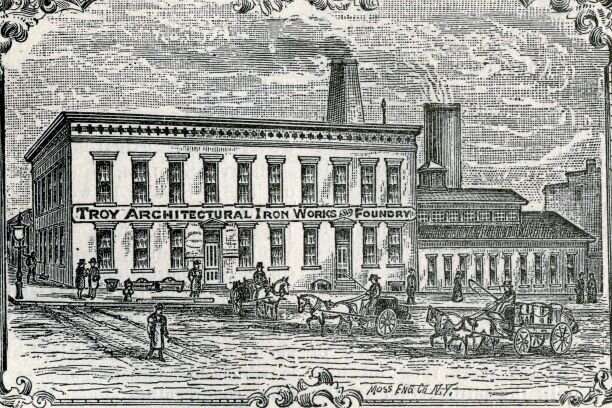Troy’s Foundry Industry: Manhole Covers
Although Troy’s foundry industry is probably best known for casting bells, stoves and railroad wheels, the city’s foundries also made a wide variety of utilitarian items. An example of this is the humble manhole cover. Many manhole covers cast in Troy from the 19th century and early 20th century still survive in the city. This is a testament to the durability of these products as well as a comment on the age of Troy’s infrastructure.
A survey of Troy resulted in the discovery of manhole covers cast by six local foundries: Neemes, Mahony, Swett/Empire, Troy Casting, Burden, Ross, and West Side.
CLICK ON IMAGES BELOW TO VIEW IN “LIGHTBOX”
Neemes Foundry on First St. today
Manhole covers from the Neemes foundry are the most numerous manhole covers still surviving in Troy. The firm’s foundry was at 206-212 First Street. Brothers Joseph H. and Spencer Neemes formed the firm in 1883 in succession of their father C.S. Neemes, who started the business in 1874. Manhole covers reading “Neemes Bros’ Troy NY.” are the most common, but others including “Neemes Foundry,” “Geo. C.S. Neemes Machinery Foundry,” “Neemes Troy Machinery Foundry” and “Neemes Bros’ Foundry Troy NY” can also be found. In addition, Neemes cast a variety of sewer grates that can still be found around the city. The firm stayed in business until the late 1930s.
Troy Architectural Iron Works, Troy, NY
Michael Mahony is better known for his line of cast iron architectural components, including complete storefronts, but he also produced less glamorous products including manhole covers. His manhole covers are inscribed “M. Mahony. Iron Founder. Troy. N.Y.” The firm, started in 1870, was also known as Mahony Manufacturing Co. and Troy Architectural Iron Works and Foundry at different times. Its works on Fifth Avenue north of Liberty Street were erected in 1878 on the location of the former Cleary brewery, and enlarged in 1881-82. Part of the site is currently used as a warehouse by Lusco Paper Co. The firm closed in about 1918.
One of the oldest iron foundries in Troy was the Empire Foundry, which was started in 1841 by Anson Atwood. George Swett bought an ownership interest in 1852, and he controlled the firm by 1886. Some manhole covers are marked “Geo. W. Swett. Troy N.Y.” and others “Geo. W. Swett & Co. Empire Foundry Troy NY”. The firm maintained offices at 219 River Street and had a foundry complex at the corner of Second Street and Ida Street. The business evolved into the Empire Stove Works. The foundry suffered a major fire in January 1902 and closed about 1905. Parts of the foundry complex are still standing, but are currently vacant and deteriorating.
Troy Casting manhole cover
Unfortunately very little is known about Troy Casting Co. Inc. This firm cast wonderfully ornate manhole covers for the New York Power and Light Corporation, an early electric utility in the Capital District. NYP&L was one of the four utility companies that were consolidated into Niagara Mohawk Power Corporation in 1950.
Burden Iron Co., most famous of course for its horseshoes, also engaged in the casting business, including manhole covers. One example, marked “Burden Iron Co Troy N Y” was found on a city street, and two other manhole covers of a different design and from an unknown location are on display at the Burden Iron Works Museum in Troy. Burden Iron Co. was purchased by Republic Steel in 1940.
Ross Valve Mfg. Co. Inc
Ross Valve Mfg. Co. Inc., started in 1879 by George Ross and still family-owned, is the only foundry still operating in Troy today. The firm now specializes in casting and machining valves for municipal water systems, but in the past it also made manhole covers associated with water supply systems. Its manhole covers marked “Ross Valve Mfg Co Troy NY” usually give access to water supply control valves. Ross still does specialty casting, including sewer grates; recent examples of these can be found at Ross Technology Park in Lansingburgh.
One manhole cover marked “West Side Structural Co Troy NY” was found on a downtown street. The company had a Troy business address but its foundry was across the Hudson River in Watervliet.








